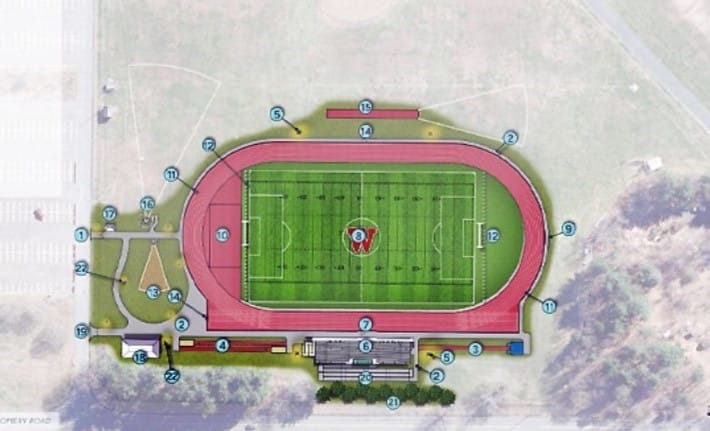A design rendering shows the proposed track and field stadium on the Westfield High School campus. Montgomery Street runs along the bottom of the image; the high school parking lot is at the left.
Reminder Publishing submitted photo
WESTFIELD — During a discussion on April 4 before the first vote on the $11.1 million bond for athletic field improvements at Westfield High School, the two major questions raised involved financial risk and the ability to prevent PFAS contamination.
In the end, the City Council voted 11-2 in favor of the bond, with a second and final vote scheduled for April 23. Dissenting were Bridget Matthews-Kane, chair of the council’s Finance Committee, and Kristen Mello, chair of the Natural Resources Committee.
Matthews-Kane told the councilors that she was the sole no vote in the 2-1 recommendation from her committee on April 2, after a long discussion and presentation by SLR Consulting, who was hired for the 25% design on the fields. The three fields include Boardman and the girls athletic fields behind Westfield High School, and a new all-purpose track and field stadium to be built next to Montgomery Road on the other side of the school.
“The first hour revolved around the three fields and their uses,” Matthews-Kane said. She said city Treasurer Matthew Barnes told the committee the bond would add $1 million per year to the city’s debt, but should not affect its credit rating.
She said even though the bond is backed by Westfield Gas & Electric, debt service payments over the life of the bond are contingent on annual votes by the Municipal Light Board.
“I did state in the Finance Committee that I would be willing to support a bond for just the track and field stadium for $7.9 million,” Matthews-Kane said, describing the financial risk which would fall to the city as “too dangerous.”
Councilor Dan Allie said he greatly appreciated WG&E putting forward the $11 million bond, and the efforts by the mayor and others to bring long overdue improvement to the athletic fields and to build a stadium.
“G&E has the resources and the reserves to support their commitment on the repayment of the bond,” Allie said.
However, Allie said he thinks all other fields besides the stadium field should be natural grass, which he said is safer for students.
“We should do our due diligence before going forward. This kind of an investment is a huge opportunity,” he said.
“We’re talking about taking the grass fields at Westfield and covering them with an impervious surface,” said Mello, who said she supports better fields and a better track. She said any runoff from the fields would go into the Powdermill Brook, and expressed concern about the presence of PFAS — artificial “forever chemicals” that can seep into groundwater and have been linked to a higher risk for cancer and other diseases — in artificial turf.
Councilor Rick Sullivan, who was a yes vote on the Finance Committee along with Councilor Brent Bean, responded.
“Clearly, from a financial point of view, it’s not a perfect deal. Yes, we have to trust G&E will vote every year to make a payment. Do I think they have the capacity — yes, they do,” Sullivan said, adding that there is little turnover on the commission. He said it’s not perfect, there’s a risk, but he’s willing to take that risk to get the project off the ground and get it done.
Bean said the Municipal Light Board voted 6-0 the night before in favor of the bond.
“This is a gift with no ulterior motives, no secret room where everybody discussed it,” he said, adding he could appreciate legitimate concerns, but quoted his mother by saying, “Don’t we want something nice?”
Sullivan said the city has been “short-arming” Westfield High School since the day it was built.
“As the first class into Westfield High School in 1973, the first event we had as students was rock day. Every … grade had to literally go onto the fields and collect all the rocks, because the city had short-armed the high school building, and forewent on the fields.”
Sullivan said he would amend the motion to include PFAS-free materials. He said there was a recommendation in the proposal that the turf be certified PFAS-free.
“My motion will be that all of the materials used to build the stadium and all the fields be certified PFAS-free,” Sullivan said, and that the mayor would include the City Council in selecting the outside testing company for the certification. “I understand this is not going to get everybody to yes.”
“I appreciate the effort, I do, and thank you,” Mello said. “Here’s the problem. The Synthetic Turf Council recently sent a letter to the state of California that they opposed a particular bill because it is not possible to create synthetic turf and backing without PFAS.”
She said manufacturerers have decided they will call artificial turf “PFAS-free” whenever it’s below 100 parts per billion in testing.
“Even if you find the mysterious component of PFAS-free material — it’s not going to stop the flooding. I’m still a no, but I do appreciate the effort,” Mello said.
Ward 1 Councilor Karen Fanion, who represents the neighborhood around Westfield High School, said she shared the concerns about PFAS and finances, but was prepared to support the project as a whole.
“I support the amendment to have a PFAS-free product.,” Fanion said. “As far as the flooding that the councilor to my left has talked about — the stormwater facility has to go through the engineer. If it doesn’t work properly, it will stop the project.”
Fanion said she trusted that there are proper checks and balances in place.
After hearing from more councilors in favor of the project, Council President John Beltrandi III asked for a vote on the amendment to include PFAS-free materials. Before the vote, Mello asked at what level and what testing would be used.
Sullivan said the city would buy from a manufacturer that sells PFAS-free material, and use testing from an outside lab hired by the city to certify it, and include yearly maintenance that will have to happen as well.
Sullivan did not accept Mello’s proposed addition of a 1 part per million standard, because he said he didn’t know whether that would prevent the project from moving forward. Sullivan’s amendment passed 12-1, with Mello voting no.
Before moving the question on the $11.1 million bond, Matthews-Kane reiterated that she would support smaller, stadium-only project.
“No one here has questioned that this is a financial risk. I want to get to yes on this, but I’m voting no in hopes that we can turn around and do the one field,” she said.
The full project is what went to vote, however, and Matthews-Kane and Mello voted no.
Sullivan said he would make a motion at the next meeting to have the mayor add natural grass for the fields other than the stadium onto the list of alternatives being considered for the project.
After the vote, Figy thanked everybody who came out to the meeting.
“This is a great example of public discourse,” he said, adding that the second reading will also require a supermajority of nine “yes” votes to pass.


